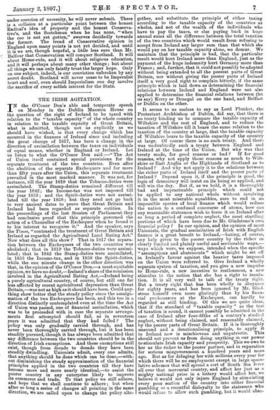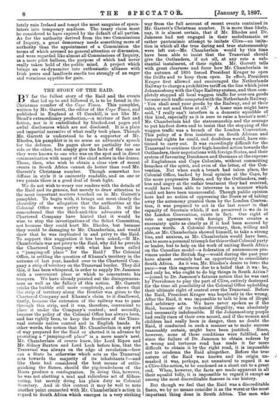THE IRISH AGITATION.
IN the O'Conor Don's able and temperate speech on Monday in the Dublin Mansion House on the question of the right of Ireland to be taxed with relation to the "taxable capacity" of the whole country in relation to the taxable capacity of Great Britain, what is admitted, though not as explicitly as we should have wished, is that every change which has occurred in the finances of Ireland since and including the great change of 1817, has been a change in the direction of assimilation between the taxes on individuals of equal means, whether in England or Ireland. Let us listen to what the O'Conor Don said :—" The Act of Union itself contained special provisions for the separate treatment of the two countries. Even after the abolition of the separate Exchequers and for more than fifty years after the Union, this separate treatment prevailed in the most marked manner. It was not, for instance, till the year 1819 that the Tobacco-duties were assimilated. The Stamp-duties remained different till the year 1842; the Income-tax was not imposed till the year 1853; and the Spirit-duties were not assimi- lated till the year 1858; but they need not go back to very ancient dates to prove that Great Britain and Ireland had been regarded as separate entities. In the proceedings of the last Session of Parliament they had conclusive proof that this principle governed the action of a. Chancellor of the Exchequer when he found it to his interest to recognise it." And the speaker, says the Times, "contrasted the treatment of Great Britain and Ireland as regarded the Agricultural Land Rating Act." Now what does all this show ? That in 1817 the separa- tion between the Exchequers of the two countries was abolished; that in 1819 the Tobacco-duties were assimi- lated; that in 1842 the Stamp-duties were assimilated, in 1853 the Income-tax, and in 1858 the Spirit-duties, while the one minute change in the other direction was that, in the opinion of the O'Conor Don,—a most equitable opinion, we have no doubt,—Ireland's share of the remission involved in the Agricultural Rating Act,---Ireland being a purely agricultural country, of course, but still one far less affected by recent agricultural depression than Great Britain,—was not as high as it should have been. Could any- thing show better that the steady policy since the amalga- mation of the two Exchequers has been, and this too in a direction distinctly contemplated even at the time the Act of Union was passed, one of financial assimilation, which was to be proceeded with in case the separate arrange- ments first attempted should fail, as in seventeen years it was admitted that they had failed ? The policy was only gradually carried through, and has never been thoroughly carried through, but it has been steadily pursued, though it has always been admitted that any difference between the two countries should be in the direction of Irish exemptions. And these exemptions still exist, though from decade to decade they have been steadily dwindling. Unionists admit, every one admits, that anything should be done which can be done,—with- out diminishing the steady approximation of the financial Principles applied in the two countries till they have become more and more nearly identical,—to assist the poorer country in any enterprise likely to improve its commerce and trade. To that policy we still adhere, and hope that we shall continue to adhere ; but when afte. r so long a series of changes all pointing in the same direction, we are called upon to change the policy alto. gether, and substitute the principle of either taxing according to the taxable capacity of the countries as wholes, and not of the wealth of the individuals who have to pay the taxes, or else paying back in huge annual sums all the difference between the total taxation of the two countries which would result from refusing to accept from Ireland any larger sum than that which she would pay on her taxable capacity alone we demur. We maintain that the principle is bad, that the particular result would hurt Ireland more than England, just as the payment of the huge indemnity hurt Germany more than France ; and, further, that it could not possibly be adopted without being extended to all the poorest parts of Great Britain, nor without giving the poorer parts of Ireland itself a very good right to complain bitterly, if the same principle which is laid down as determining the financial relations between Ireland and England were not also applied to determine the financial relations between (let us say) Kerry or Donegal on the one hand, and Belfast or Dublin on the other.
It seems to us useless to say as Lord Plunket, the Protestant Archbishop of Dublin, did say, that there is no treaty binding us to compare the taxable capacity of Wiltshire and the rest of England, and to reduce the taxation of Wiltshire till it bears the same relation to the taxation of the country at large, that the taxable ckpacity of Wiltshire bears to the taxable capacity of the country at large. Of course there is no such treaty. And thero was undoubtedly such a treaty between England and Ireland at the time of the Union. But why was that treaty made, for good reasons or bad ? If for good reasons, why not apply those reasons as much to Wilt- shire or East Anglia or the Highlands of Scotland as to Ireland ? And why not apply it to the relations between the richer parts of Ireland itself and the poorer parts of Ireland ? Depend upon it, if the principle is good, the logic of democracy will insist on its being so applied, and will win the day. But if, as we hold, it is a thoroughly bad and impracticable principle which could not be applied to any national whole without involving it in the most miserable squabbles, sure to end in an impossible species of local finance which would reduce the nation to a confused concourse of atoms, how can any reasonable statesmen wish to force it on Ireland after so long a, period of complete neglect, the most startling portions of which have been due to Mr. Gladstone's own financial policy ? In our opinion, and the opinion of most Unionists, the gradual assimilation of Irish with English finance is a great benefit to Ireland,—bating, of course, any help given to the poorer country by the richer in clearly limited and plainly useful and serviceable ways,— ways which were, we suppose, intended when the specific "assumptions and abatements" which might be set off in Ireland's favour against the heavier taxes imposed on the Union were referred to. Give Ireland a wholly separate system of taxation, and you give a new impulse to Home-rule, a new incentive to restlessness, a new stimulus to the notion that she has a right to insula- tion. It is all very well to talk of the treaty right. But a treaty right that has been wholly in abeyance for eighty years, and has been ignored by Mr. Glad- stone himself even more glaringly than by his finan- cial predecessors at the Exchequer, can hardly be regarded as still binding. Of this we are quite clear, that if the standard of "taxable capacity" as the test of taxation is sound, it cannot possibly be admitted in the case of Ireland after four-fifths of a century's studied neglect, without being claimed, and reasonably claimed, by the poorer parts of Great Britain. If it is thoroughly unsound and a denationalising principle, to apply it to Ireland now is mischievous and unpatriotic. This should not prevent us from doing anything in our power to stimulate Irish capacity and prosperity. This we owe to her as the richer to the poorer partner, and in reparation for serious misgovernment a hundred years and more ago. But as for deluging her with millions every year for which there will be no employment except in large specu- lative schemes that will spread a sort of South Sea fever all over that mercurial country, and affect her just as a mighty national prize in a. lottery would affect her, we believe it would not only injure England by stimulating every poor section of the country into either financial gambling or a resentful disloyalty to the statesmen who would refuse to allow such gambling, but it would abso- , lutely ruin Ireland. and tempt the most sanguine of specu- lators into temporary madness. The treaty claim must be considered to have expired by the default of all parties. As for the authority derived from the two Commissions of Inquiry, a great democracy needs something more of authority than the appointment of a Commission the terms of which aroused no general attention or discussion, and were regarded like almost all Commissions of Inquiry, as a mere pilot balloon, the purpose of which had never really taken hold of the public mind. A project which brings an ex-dynamiter into enthusiastic alliance with Irish peers and landlords smells too strongly of an eager and voracious appetite for gain.















































 Previous page
Previous page